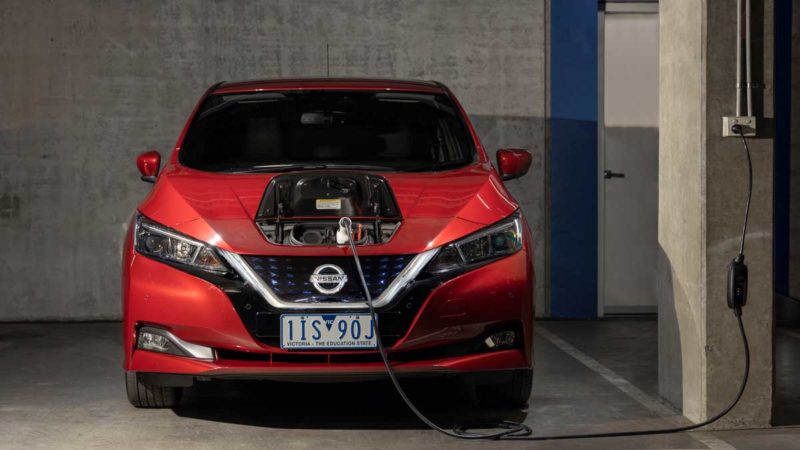Further details about the new ZLEV (zero and low-emissions vehicle) road-user charge have been published on the Vicroads website, repeating treasurer Tim Pallas’ message that EV owners don’t pay enough tax, and also revealing that they will need to self-report kilometres to calculate the fee.
The introduction of the tax, which is also being touted by both South Australia and New South Wales – has been met with widespread opposition from the mainstream automotive and environmental sectors alike.
Critics say the policy has been poorly thought out, will stifle fleet investment in electric vehicles, and have an impact a growing local EV industry and secondhand EV market, and runs counter to the incentives offered in many other countries.
The tax, first announced will be applied only to pure electric and plug-in hybrid vehicles, at a rate of 2.5c or 2c per kilometre respectively.
Owners of electric and plug-in hybrid cars will self report their odomoter at registration time before paying the new road usage fee to be introduced by the Victorian government.
But those concerned that the fee may require installation of GPS trackers in their vehicles, as was bizarrely suggested by South Australia, can put their minds to rest.
“For us to work out the ZLEV charge against the distance you’ve travelled, you’ll need to provide us with odometer readings,” the Vicroads website states.
All-electric and plug-in hybrid vehicles will also still receive a $100 discount on annual registration, the document states, while non-pluggable hybrids – which are not subject to the new tax – will no longer be eligible for the discount.
Criticism continues to mount, with The Australia Institute holding a well attended webinar on Wednesday, pointing to the impact of EV incentives in countries like Norway, where the percentage of EV sales has reached nearly 80 per cent, and which will ban all new petrol, diesel and hybrid sales from 2025.
“Other countries are using the willingness of some people to pay a personal premium to buy electric cars as a way to drive down greenhouse gas emissions at very low cost to government, but Australia seems determined to hold back the tide of technology,” TAI economist Richard Denniss said.
“Like anything to do with fossil fuels in Australia, taxing EVs is just part of a culture war. Just like the world is going to stop buying our coal, the world is moving away from combustion engines. Instead of embracing the future, we’re trying to hold back the tide.
On the VicRoads website, there are some misleading, and at times confusing, messages.
One such example is this: “Australian drivers pay fuel excise when they fill up their vehicle with petrol, diesel or LPG. ZLEV owners currently pay little or no fuel excise but still use our roads. These changes ensure ZLEV owners make a fair contribution to funding Victorian roads.”
As noted in this EY report released in September, electric vehicles are far from a drain on tax revenue – in fact, electric vehicles deliver an additional $1,370 a year to government revenues because they already pay more tax, as you can here and here.
The Vicroads page also says that “ZLEVs have environmental and health benefits” – which in and of themselves mean less financial burden on the economy, unlike petrol and diesel vehicles.
It then says, “owners of these vehicles will continue to pay less than other vehicles – about 2 cents/km less than an average driver pays in fuel excise,” – although in the case of hybrids, this has already been debunked by The Driven here.
And, while Vicroads says the tax is being introduced because the state government wants EV owners to contribute towards roads, it also say the funds will be used to accelerate the roll out of EV infrastructure.
“The Government will use the revenue raised from the first few years of this charge to invest in accelerating the adoption of zero and low emission vehicles,” the page says.
“This will include new electric vehicle charging infrastructure and reforms to enable electric vehicle ready new buildings.”
To date, the Victorian government has invested almost $4 million in rolling out electric vehicle charging infrastructure across the state of Victoria.
Pallas said on Saturday the new road user tax is expected to bring in $30 million over forward estimates.
The Vicroads ZLEV fee page says, “The average distanced traveled for light passenger vehicles in Victoria is approximately 13,100 km a year so, on average, electric vehicle owners will pay an additional $330 a year and plug-in hybrid-electric vehicles owners will pay an additional $260 a year.”
This would mean approximately 100,000 new electric and plug-in hybrid vehicles would need to be registered in Victoria – a big call considering drivers are effectively being dissuaded, rather than encouraged, by the new fee.

Bridie Schmidt is associate editor for The Driven, sister site of Renew Economy. She has been writing about electric vehicles since 2018, and has a keen interest in the role that zero-emissions transport has to play in sustainability. She has participated in podcasts such as Download This Show with Marc Fennell and Shirtloads of Science with Karl Kruszelnicki and is co-organiser of the Northern Rivers Electric Vehicle Forum. Bridie also owns a Tesla Model Y and has it available for hire on evee.com.au.

